23 apr 2016
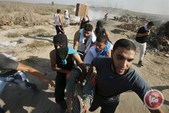
Five Palestinians were injured when clashes broke out across the Gaza Strip on Friday night after Israeli forces attempted to suppress weekly protests, Gaza’s Ministry of Health said.
One Palestinian was injured with live fire, and two suffered from excessive tear gas inhalation near the Nahal Oz crossing in the northeastern Gaza Strip.
Near the Erez crossing in the northern Gaza Strip, two Palestinians suffered from excessive tear gas inhalation when Israeli forces attempted to suppress a protest there.
An Israeli army spokesperson told Ma’an they did not have information on clashes in the Gaza Strip Friday evening.
Also on Friday, a Palestinian teenager was wounded by a rubber-coated steel bullet and dozens others suffered excessive tear gas inhalation when Israeli forces dispersed weekly protests across the occupied West Bank.
The clashes came amidst tightened security measures implemented by the Israeli authorities for the Jewish holiday of Passover. All crossings in the Gaza Strip and occupied West Bank were closed to Palestinians beginning midnight Thursday, in effect until midnight Saturday.
Palestinians in the Gaza Strip crowd near the borders with Israel every Friday to show solidarity with what Palestinians in besieged coastal enclave have termed the “Jerusalem Intifada” taking place in the occupied West Bank and East Jerusalem.
Nearly 30 Palestinians have been killed by Israeli forces in the Gaza Strip since the unrest spread in October, the majority shot dead during clashes on the Gaza-Israel border.
More than 1,300 Palestinians have been injured by Israeli forces since the start of this year, the majority during clashes that broke out with the Israeli military during protests in the occupied West Bank, according to the UN Office for the Coordination of Humanitarian Affairs.
Earlier this month, the US accused Israel of an "excessive use of force" against Palestinians, amounting to a violation of human rights, in its annual report of global human rights abuses.
One Palestinian was injured with live fire, and two suffered from excessive tear gas inhalation near the Nahal Oz crossing in the northeastern Gaza Strip.
Near the Erez crossing in the northern Gaza Strip, two Palestinians suffered from excessive tear gas inhalation when Israeli forces attempted to suppress a protest there.
An Israeli army spokesperson told Ma’an they did not have information on clashes in the Gaza Strip Friday evening.
Also on Friday, a Palestinian teenager was wounded by a rubber-coated steel bullet and dozens others suffered excessive tear gas inhalation when Israeli forces dispersed weekly protests across the occupied West Bank.
The clashes came amidst tightened security measures implemented by the Israeli authorities for the Jewish holiday of Passover. All crossings in the Gaza Strip and occupied West Bank were closed to Palestinians beginning midnight Thursday, in effect until midnight Saturday.
Palestinians in the Gaza Strip crowd near the borders with Israel every Friday to show solidarity with what Palestinians in besieged coastal enclave have termed the “Jerusalem Intifada” taking place in the occupied West Bank and East Jerusalem.
Nearly 30 Palestinians have been killed by Israeli forces in the Gaza Strip since the unrest spread in October, the majority shot dead during clashes on the Gaza-Israel border.
More than 1,300 Palestinians have been injured by Israeli forces since the start of this year, the majority during clashes that broke out with the Israeli military during protests in the occupied West Bank, according to the UN Office for the Coordination of Humanitarian Affairs.
Earlier this month, the US accused Israel of an "excessive use of force" against Palestinians, amounting to a violation of human rights, in its annual report of global human rights abuses.
22 apr 2016
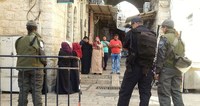
The number of Palestinians banished from the Aqsa Mosque, the Old City or Jerusalem since the start of the current month increased on Friday to about 70 Jerusalemite citizens.
Some of those Palestinians are elderly people from the 1948 occupied lands and Jerusalem, and were given entry bans for 15 days to six months.
According to Quds Press, dozens of Jerusalemite citizens received on Thursday and Friday orders banning their entry to the Aqsa Mosque, the Old City or Jerusalem.
25 young men received orders banning their entry to the Aqsa Mosque for 15 days after they were arrested during raids on their homes at dawn Friday in east Jerusalem neighborhoods. Five others were detained on Thursday, four of them were banished from the Old City for eight to 10 days and one was banned from entering Jerusalem for four days.
The Israeli police claimed these entry ban orders were part of security measures aimed at preventing tension during the season of Jewish holidays.
Some Palestinians from Jerusalem were also placed under house arrest as part of those Israeli measures. Sheikh Ikrima Sabri, preacher of the Aqsa Mosque, warned in his Friday khutba (sermon) of Israeli attempts to decrease the number of Muslim worshipers at the Aqsa Mosque during the Jewish holidays, and urged the Palestinians to intensify their presence at the Islamic holy place.
Some of those Palestinians are elderly people from the 1948 occupied lands and Jerusalem, and were given entry bans for 15 days to six months.
According to Quds Press, dozens of Jerusalemite citizens received on Thursday and Friday orders banning their entry to the Aqsa Mosque, the Old City or Jerusalem.
25 young men received orders banning their entry to the Aqsa Mosque for 15 days after they were arrested during raids on their homes at dawn Friday in east Jerusalem neighborhoods. Five others were detained on Thursday, four of them were banished from the Old City for eight to 10 days and one was banned from entering Jerusalem for four days.
The Israeli police claimed these entry ban orders were part of security measures aimed at preventing tension during the season of Jewish holidays.
Some Palestinians from Jerusalem were also placed under house arrest as part of those Israeli measures. Sheikh Ikrima Sabri, preacher of the Aqsa Mosque, warned in his Friday khutba (sermon) of Israeli attempts to decrease the number of Muslim worshipers at the Aqsa Mosque during the Jewish holidays, and urged the Palestinians to intensify their presence at the Islamic holy place.
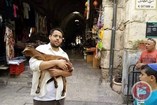
Israeli police on Friday banned 29 Palestinian worshippers from the Al-Aqsa Mosque compound and detained seven right-wing Jewish Israelis amid heightened tensions over the Jewish holiday of Passover.
Israeli police spokesperson Luba al-Samri said in a statement that Israeli police had arrested three right-wing Jewish Israelis on Friday morning for bringing two goats toward the compound's gates as a sacrifice for the Jewish holiday.
Later on Friday afternoon, police arrested four more Jewish Israelis at the holy site's Moroccan Gate who were also on their way to make a sacrifice. All the goats were confiscated, al-Samri said.
"Israeli police are working to allow worshipers of the three religions (Muslims, Christians, and Jews) to practice their religious rituals in Jerusalem and maintain their safety," she said.
Ahead of Passover, right-wing Jewish organizations had urged Jews to flock to Jerusalem's Mount of Olives and the Al-Aqsa Mosque compound to offer sacrifices, Israeli media reported.
Meanwhile, a number of Palestinian worshipers were banned from the holy site following an extensive detention campaign by Israeli forces in occupied East Jerusalem the night before the Jewish holiday.
While one of the Palestinian detainees was transferred into administrative detention, another 55 others were released on the condition that they be banned from entering the Al-Aqsa Mosque compound.
The head of the Jerusalem Detainees Committee, Amjad Abu Asab, said the al-Qishla police center had released 19 Palestinian were were detained early Friday after banning them from entering al-Aqsa for 15 days.
Meanwhile, Muhammad Mahmoud, a lawyer with Palestinian prisoners' rights group Addameer, told Ma'an that an Israeli court released five previously detained youths on the condition that they be banned from the holy site until May 10, in addition to eight days of house arrest.
Mahmoud said five other youths were banned from the mosque for periods ranging from eight to 15 days, bringing the total banned from the mosque to 29.
The security crack-down comes as the Israeli authorities suspended visits to Jerusalem for Gazans and closed all crossing for Palestinians in the occupied West Bank and the Gaza Strip, amid tightened security measures for the holiday.
Israeli police spokesperson Luba al-Samri said in a statement that Israeli police had arrested three right-wing Jewish Israelis on Friday morning for bringing two goats toward the compound's gates as a sacrifice for the Jewish holiday.
Later on Friday afternoon, police arrested four more Jewish Israelis at the holy site's Moroccan Gate who were also on their way to make a sacrifice. All the goats were confiscated, al-Samri said.
"Israeli police are working to allow worshipers of the three religions (Muslims, Christians, and Jews) to practice their religious rituals in Jerusalem and maintain their safety," she said.
Ahead of Passover, right-wing Jewish organizations had urged Jews to flock to Jerusalem's Mount of Olives and the Al-Aqsa Mosque compound to offer sacrifices, Israeli media reported.
Meanwhile, a number of Palestinian worshipers were banned from the holy site following an extensive detention campaign by Israeli forces in occupied East Jerusalem the night before the Jewish holiday.
While one of the Palestinian detainees was transferred into administrative detention, another 55 others were released on the condition that they be banned from entering the Al-Aqsa Mosque compound.
The head of the Jerusalem Detainees Committee, Amjad Abu Asab, said the al-Qishla police center had released 19 Palestinian were were detained early Friday after banning them from entering al-Aqsa for 15 days.
Meanwhile, Muhammad Mahmoud, a lawyer with Palestinian prisoners' rights group Addameer, told Ma'an that an Israeli court released five previously detained youths on the condition that they be banned from the holy site until May 10, in addition to eight days of house arrest.
Mahmoud said five other youths were banned from the mosque for periods ranging from eight to 15 days, bringing the total banned from the mosque to 29.
The security crack-down comes as the Israeli authorities suspended visits to Jerusalem for Gazans and closed all crossing for Palestinians in the occupied West Bank and the Gaza Strip, amid tightened security measures for the holiday.
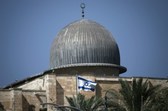
An Israeli flag, displayed on a roof of a settlement in East Jerusalem, is seen in front of the dome of the Al-Aqsa Mosque
The Israeli authorities suspended visits to Jerusalem and the Al-Aqsa Mosque for Gazans on Friday due to the Jewish holiday of Passover.
Israeli authorities prevented dozens of Palestinians over the age of 60 from traveling to Jerusalem via the Erez crossing for their weekly Friday worship at Al-Aqsa Mosque, sources at the Palestinian liaison office told Ma'an.
Israeli forces implemented complete closures on crossings in the occupied West Bank and Gaza Strip for Palestinians on the Jewish holiday. The closure began midnight Thursday and is to be in effect until midnight Saturday.
Only humanitarian, medical, and other exceptional cases would be allowed to cross after obtaining approval from Israel's Coordinator of Government Activities in the Territories (COGAT).
Tightened security measures were also enforced in Jerusalem, with extra police units deployed in public areas and an emphasis on occupied East Jerusalem's Old City. Israeli forces also detained at least 20 Palestinians across east Jerusalem in predawn raids Friday.
The suspension of Al-Aqsa visits for Gazans comes one week after some 200 Palestinians above the age of 60 were permitted to cross out of the besieged coastal enclave for the first time since a one-month freeze on visitation was lifted by Israel.
Israel, following the ceasefire agreement that ended its brutal offensive on the Gaza Strip in 2014, began permitting 200 elderly Gazans to worship at the holy site every Friday.
However, Israel froze the agreement on March 16 due to allegations that Palestinians traveling for worship were not returning to the Gaza Strip on the same day of the visit, as the agreement stipulated, posing a “threat to security.”
The ban was lifted last Friday as part of Israel’s “extensive civil policy towards the Gaza Strip,” as long as Palestinians “meet their commitments,” a spokesperson for Israel's Coordinator of Government Activities in the Territories (COGAT) told Ma’an at the time.
An Israeli army spokesperson told Ma’an that Friday’s suspension was related to the Passover holiday, and visits are expected to resume the following week.
The majority of the more than 1.8 million Palestinians in the Gaza Strip are sealed inside the coastal enclave due to a near-decade long military blockade imposed by Israel and upheld by Egypt on the southern border.
The Israeli authorities suspended visits to Jerusalem and the Al-Aqsa Mosque for Gazans on Friday due to the Jewish holiday of Passover.
Israeli authorities prevented dozens of Palestinians over the age of 60 from traveling to Jerusalem via the Erez crossing for their weekly Friday worship at Al-Aqsa Mosque, sources at the Palestinian liaison office told Ma'an.
Israeli forces implemented complete closures on crossings in the occupied West Bank and Gaza Strip for Palestinians on the Jewish holiday. The closure began midnight Thursday and is to be in effect until midnight Saturday.
Only humanitarian, medical, and other exceptional cases would be allowed to cross after obtaining approval from Israel's Coordinator of Government Activities in the Territories (COGAT).
Tightened security measures were also enforced in Jerusalem, with extra police units deployed in public areas and an emphasis on occupied East Jerusalem's Old City. Israeli forces also detained at least 20 Palestinians across east Jerusalem in predawn raids Friday.
The suspension of Al-Aqsa visits for Gazans comes one week after some 200 Palestinians above the age of 60 were permitted to cross out of the besieged coastal enclave for the first time since a one-month freeze on visitation was lifted by Israel.
Israel, following the ceasefire agreement that ended its brutal offensive on the Gaza Strip in 2014, began permitting 200 elderly Gazans to worship at the holy site every Friday.
However, Israel froze the agreement on March 16 due to allegations that Palestinians traveling for worship were not returning to the Gaza Strip on the same day of the visit, as the agreement stipulated, posing a “threat to security.”
The ban was lifted last Friday as part of Israel’s “extensive civil policy towards the Gaza Strip,” as long as Palestinians “meet their commitments,” a spokesperson for Israel's Coordinator of Government Activities in the Territories (COGAT) told Ma’an at the time.
An Israeli army spokesperson told Ma’an that Friday’s suspension was related to the Passover holiday, and visits are expected to resume the following week.
The majority of the more than 1.8 million Palestinians in the Gaza Strip are sealed inside the coastal enclave due to a near-decade long military blockade imposed by Israel and upheld by Egypt on the southern border.
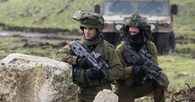
The Israeli occupation army has announced it will impose, as of Friday, a 48-hour closure on the West Bank and the Gaza Strip, banning Palestinians from entering Israeli areas during the Jewish Passover holiday.
According to Yedioth Ahronoth newspaper, the closure will last for two days, starting at midnight between Thursday and Friday and ending on Saturday night.
In another incident, the Israeli police on Thursday evening gave two Jerusalemite young men written orders banning their entry to the Aqsa Mosque for four to 10 days. The police also arrested two young men and summoned another in the holy city.
According to Yedioth Ahronoth newspaper, the closure will last for two days, starting at midnight between Thursday and Friday and ending on Saturday night.
In another incident, the Israeli police on Thursday evening gave two Jerusalemite young men written orders banning their entry to the Aqsa Mosque for four to 10 days. The police also arrested two young men and summoned another in the holy city.
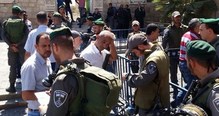
Thousands of Israeli occupation soldiers and police were seen deployed across Occupied Jerusalem city to mark the first day of the Jewish Passover holiday, turning the holy city into a military barrack.
Friday April 22 marks the first day of the eight-day Jewish Passover holiday. The Israeli occupation police tightened grip around Occupied Jerusalem to provide a security shield for the hordes of Israeli fanatics as they perform their sacrilegious rituals.
A total of 45 beaches, besides several holy sites and markets, were prepared, at the request of the Israeli Interior Minister, for the influx of Israeli extremists during the Passover.
The Israeli occupation authorities also announced their intents to crack down on Palestinian West Bankers residing or working in 1948 Occupied Palestine. Researcher Raed Fathi warned of the serious repercussions of such a celebration in a city where tension has already reached a peak due to Israeli provocations.
“Over ancient times, nobody would dare call for mass break-ins at Muslims’ the al-Aqsa Mosque or slaughter sacrifices in the site. However over the past couple of weeks, Israel’s alleged temple mount gangs have been inciting for storming al-Aqsa at noontime on Friday and performing sacrilegious rituals near the Maghareba Gate,” Fathi said.
“Such rituals represent a provocation to the sentiments of the Muslim worshipers. The real crux of the matter is that the Israeli occupation wants to impose a religious sovereignty over the Mosque and force a new fait accompli on the ground,” the expert further warned.
The advent of the Jewish Passover culminated in a tight security cordon imposed by the Israeli occupation army on the occupied West Bank and the blockaded Gaza Strip. The Israeli occupation authorities further ruled for sealing off all military checkpoints for 48 hours starting Friday.
20 arbitrary abductions, bans from al-Aqsa, and interrogations summonses have also been documented since predawn time as part of a preplanned Israeli sweep across the occupied Palestinian territories. An Israeli ban also prevented elderly Palestinians (above 60 years old) living in the Gaza Strip from performing Friday prayers at al-Aqsa.
Friday April 22 marks the first day of the eight-day Jewish Passover holiday. The Israeli occupation police tightened grip around Occupied Jerusalem to provide a security shield for the hordes of Israeli fanatics as they perform their sacrilegious rituals.
A total of 45 beaches, besides several holy sites and markets, were prepared, at the request of the Israeli Interior Minister, for the influx of Israeli extremists during the Passover.
The Israeli occupation authorities also announced their intents to crack down on Palestinian West Bankers residing or working in 1948 Occupied Palestine. Researcher Raed Fathi warned of the serious repercussions of such a celebration in a city where tension has already reached a peak due to Israeli provocations.
“Over ancient times, nobody would dare call for mass break-ins at Muslims’ the al-Aqsa Mosque or slaughter sacrifices in the site. However over the past couple of weeks, Israel’s alleged temple mount gangs have been inciting for storming al-Aqsa at noontime on Friday and performing sacrilegious rituals near the Maghareba Gate,” Fathi said.
“Such rituals represent a provocation to the sentiments of the Muslim worshipers. The real crux of the matter is that the Israeli occupation wants to impose a religious sovereignty over the Mosque and force a new fait accompli on the ground,” the expert further warned.
The advent of the Jewish Passover culminated in a tight security cordon imposed by the Israeli occupation army on the occupied West Bank and the blockaded Gaza Strip. The Israeli occupation authorities further ruled for sealing off all military checkpoints for 48 hours starting Friday.
20 arbitrary abductions, bans from al-Aqsa, and interrogations summonses have also been documented since predawn time as part of a preplanned Israeli sweep across the occupied Palestinian territories. An Israeli ban also prevented elderly Palestinians (above 60 years old) living in the Gaza Strip from performing Friday prayers at al-Aqsa.
21 apr 2016
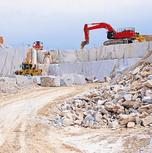
3,500 Palestinians may be out of work after Israel closes three quarries just outside the village of Beit Fajar; COGAT says quarries are operated illegally on state land, but Palestinians claim that they own the land on which the quarries are located.
The future of the Palestinian town of Beit Fajar looks bleak after Israel's military forced the shutdown of some three dozen quarries in the area, endangering 3,500 jobs and paralyzing the dominant local industry.
Palestinian quarry owners and their lawyer say March 21 raids of the quarries by hundreds of Israeli soldiers and the confiscation of millions of dollars in equipment amount to collective punishment. The raids came four days after two Beit Fajar residents stabbed and wounded an Israeli soldier.
The fate of the quarries also highlights Israel's policy of favoring Israeli settlement businesses in the occupied West Bank over those of local Palestinians, the New York-based group Human Rights Watch said Thursday. Israel has not issued new licenses for Palestinian-run quarries in the West Bank since 1994, while giving operating permits to 11 Israeli-run quarries in the area, the group said.
The Israeli-administered quarries produce 25 percent of the quarrying materials for the Israeli and settlement economies, amounting to Israeli exploitation of natural resources in occupied territories in violation of Israel's obligations as an occupying power, HRW said.
"I think Israel wants to strike at the Palestinian economy," said Subhi Thawabteh, head of the Union of Stone and Marble in Palestine. "This is part of the Israeli pressure on the Palestinians. They want us to desert our land and fill it with Israeli settlers."
COGAT (Coordnator Of Government Activities in the Territories), the Israeli military body that deals with Palestinian civilian affairs, did not respond to requests for comment. COGAT wrote to HRW that the quarries operate unlawfully, on state land, and that they pose a safety and environmental hazard.
Roni Salman, a lawyer representing the Palestinian quarry owners, said he believes the raids amounted to "collective punishment of the people of Beit Fajar" for the attack carried out by the two village residents.
Human Rights Watch also noted that a previous raid of quarries by the military came three days after a Beit Fajar resident killed an Israeli woman in a West Bank attack in November.
Asked about the timing, COGAT wrote that the raids were carried out once resources were available and "as per priority."
Quarry owners said troops confiscated equipment in the past, but that the heavy machinery was usually returned after payment of heavy fines. This time, Israel had stiffer demands.
In a letter to HRW, it said that quarry owners will have to pledge to "cease illegal operations." They would also have to reimburse the military for the cost of confiscating equipment and pay retroactive royalties for extracting stones.
Salman, the lawyer, said he is trying to persuade quarry owners to appeal to Israel's Supreme Court to try to challenge Israel's overall policy.
Underlying the dispute is a complex division of the West Bank into jurisdictions — a legacy of failed negotiations on Palestinian statehood on lands Israel captured in 1967, including the West Bank.
Israel retains full control over more than 60 percent of the West Bank, known as "Area C" and home to dozens of Israeli settlements with some 370,000 residents. The rest of the territory, where most Palestinians live, is under varying degrees of Palestinian self-rule.
Beit Fajar, near biblical Bethlehem, is located in autonomous territory, but the quarries are in Area C. Israel argues that the quarries are on state land, a designation critics say has routinely been used to take lands from Palestinians.
Human Rights Watch quoted three Palestinian quarry owners as saying they have repeatedly tried to prove ownership of the land, but have been rejected. Quarry owners also said they repeatedly asked for licenses, but were ignored or turned down.
"This is our land, it's in our village, not in Israel," quarry owner Abdel Moin al-Taweel said this week, after seeing two bulldozers and other heavy equipment confiscated.
Quarries and stone factories are the economic bedrock of Beit Fajar, employing some 3,500 people and producing an estimated $25 million a year.
Sari Bashi, the Israel and Palestine director at HRW, said the latest measures counter recent assurances by the military to facilitate Palestinian economic development.
"Instead, it is choking a Palestinian-run industry in the West Bank, while promoting the same industry in Israeli settlements," she said.
The future of the Palestinian town of Beit Fajar looks bleak after Israel's military forced the shutdown of some three dozen quarries in the area, endangering 3,500 jobs and paralyzing the dominant local industry.
Palestinian quarry owners and their lawyer say March 21 raids of the quarries by hundreds of Israeli soldiers and the confiscation of millions of dollars in equipment amount to collective punishment. The raids came four days after two Beit Fajar residents stabbed and wounded an Israeli soldier.
The fate of the quarries also highlights Israel's policy of favoring Israeli settlement businesses in the occupied West Bank over those of local Palestinians, the New York-based group Human Rights Watch said Thursday. Israel has not issued new licenses for Palestinian-run quarries in the West Bank since 1994, while giving operating permits to 11 Israeli-run quarries in the area, the group said.
The Israeli-administered quarries produce 25 percent of the quarrying materials for the Israeli and settlement economies, amounting to Israeli exploitation of natural resources in occupied territories in violation of Israel's obligations as an occupying power, HRW said.
"I think Israel wants to strike at the Palestinian economy," said Subhi Thawabteh, head of the Union of Stone and Marble in Palestine. "This is part of the Israeli pressure on the Palestinians. They want us to desert our land and fill it with Israeli settlers."
COGAT (Coordnator Of Government Activities in the Territories), the Israeli military body that deals with Palestinian civilian affairs, did not respond to requests for comment. COGAT wrote to HRW that the quarries operate unlawfully, on state land, and that they pose a safety and environmental hazard.
Roni Salman, a lawyer representing the Palestinian quarry owners, said he believes the raids amounted to "collective punishment of the people of Beit Fajar" for the attack carried out by the two village residents.
Human Rights Watch also noted that a previous raid of quarries by the military came three days after a Beit Fajar resident killed an Israeli woman in a West Bank attack in November.
Asked about the timing, COGAT wrote that the raids were carried out once resources were available and "as per priority."
Quarry owners said troops confiscated equipment in the past, but that the heavy machinery was usually returned after payment of heavy fines. This time, Israel had stiffer demands.
In a letter to HRW, it said that quarry owners will have to pledge to "cease illegal operations." They would also have to reimburse the military for the cost of confiscating equipment and pay retroactive royalties for extracting stones.
Salman, the lawyer, said he is trying to persuade quarry owners to appeal to Israel's Supreme Court to try to challenge Israel's overall policy.
Underlying the dispute is a complex division of the West Bank into jurisdictions — a legacy of failed negotiations on Palestinian statehood on lands Israel captured in 1967, including the West Bank.
Israel retains full control over more than 60 percent of the West Bank, known as "Area C" and home to dozens of Israeli settlements with some 370,000 residents. The rest of the territory, where most Palestinians live, is under varying degrees of Palestinian self-rule.
Beit Fajar, near biblical Bethlehem, is located in autonomous territory, but the quarries are in Area C. Israel argues that the quarries are on state land, a designation critics say has routinely been used to take lands from Palestinians.
Human Rights Watch quoted three Palestinian quarry owners as saying they have repeatedly tried to prove ownership of the land, but have been rejected. Quarry owners also said they repeatedly asked for licenses, but were ignored or turned down.
"This is our land, it's in our village, not in Israel," quarry owner Abdel Moin al-Taweel said this week, after seeing two bulldozers and other heavy equipment confiscated.
Quarries and stone factories are the economic bedrock of Beit Fajar, employing some 3,500 people and producing an estimated $25 million a year.
Sari Bashi, the Israel and Palestine director at HRW, said the latest measures counter recent assurances by the military to facilitate Palestinian economic development.
"Instead, it is choking a Palestinian-run industry in the West Bank, while promoting the same industry in Israeli settlements," she said.
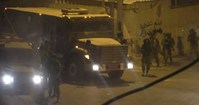
The Israeli security cabinet has declared that the army will continue to operate in Palestinian areas known as "Area A" in the West Bank in accordance with Israel's security needs.
"The prime minister, defense minister and chief of staff made clear that the IDF reserves and will reserve the right to enter Area A and anywhere needed according to operational needs, and that there is no other agreement with the Palestinians," spokesman for the government Ofir Gendelman told a news conference following a meeting held by the security cabinet on Wednesday.
According to the 1993 Oslo accords, Area A is under full civil and security control by the Palestinian Authority (PA) and comprises only about 18 percent of the West Bank.
The PA recently engaged in talks with the Israeli side to demand the latter to withdraw from Area A and honor a provision of the Oslo Accords that gives the PA responsibility for civilian and security affairs in its territory.
"The prime minister, defense minister and chief of staff made clear that the IDF reserves and will reserve the right to enter Area A and anywhere needed according to operational needs, and that there is no other agreement with the Palestinians," spokesman for the government Ofir Gendelman told a news conference following a meeting held by the security cabinet on Wednesday.
According to the 1993 Oslo accords, Area A is under full civil and security control by the Palestinian Authority (PA) and comprises only about 18 percent of the West Bank.
The PA recently engaged in talks with the Israeli side to demand the latter to withdraw from Area A and honor a provision of the Oslo Accords that gives the PA responsibility for civilian and security affairs in its territory.
